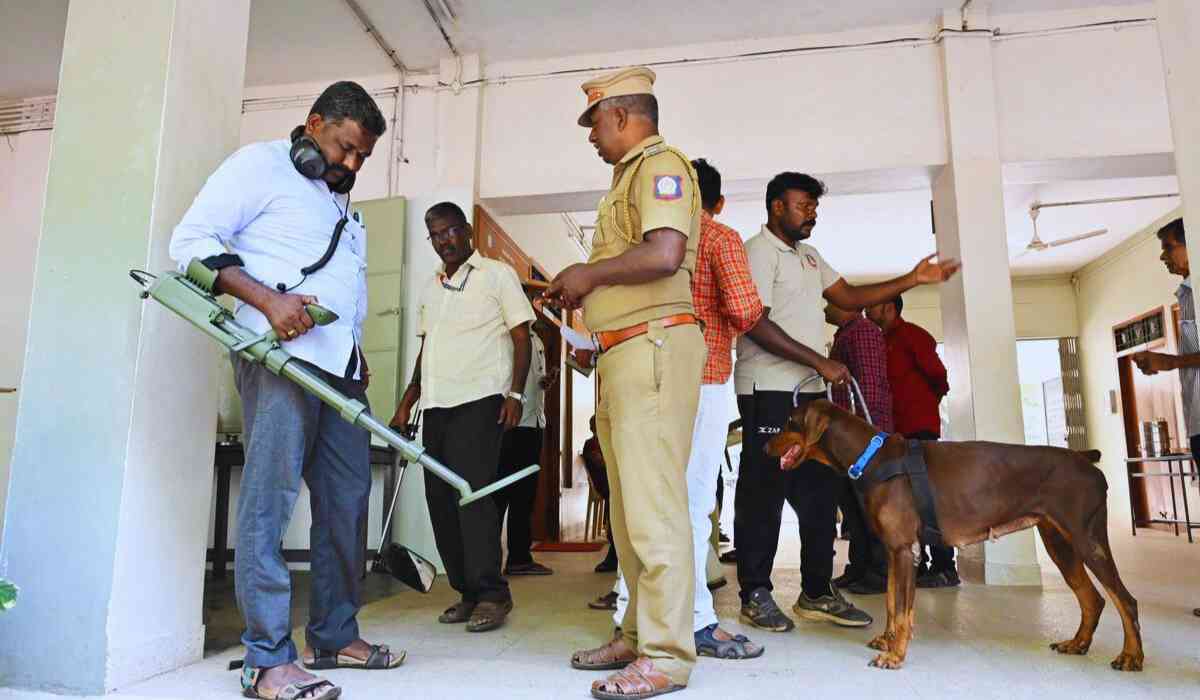Schools are meant to be spaces for learning, growth, and safety. However, recent hoax bomb threats in Erode, Tamil Nadu, give a shocking picture of how some students are misusing technology for their whims. These incidents highlight a troubling mentality among certain students, who fail to consider the fear and disruption such immature actions create.
Bomb threats in schools have become a concern, especially in Erode, Tamil Nadu. Multiple hoax bomb threats in recent times have hit the news headlines. While investigations reveal that most of these threats are hoaxes, their negative impact cannot be ignored.
A Startling Trend in Student Mentality
Bomb threat hoaxes reflect an unsettling trend among some of today’s students who exploit fear for amusement. This behavior often stems from a lack of discipline, improper guidance, and an increasing disconnect between students’ academic obligations and personal priorities. Many students struggle to find constructive outlets, resorting to disruptive actions that bring temporary relief but prolonged societal consequences.
What Happened in Erode Schools?
Bomb Threat at Bharathi Vidya Bhavan School
On January 21, 2025, Bharathi Vidhya Bhavan Matriculation Higher Secondary School in Thindal received an email about a bomb threat at 1.30 pm. The email stated a bomb had been planted on a school premises. The school acted immediately and evacuated students and also informed police. The district police and Bomb Detection and Disposal Squad (BDDS) conducted a meticulous search, only to confirm the email was a hoax.
Another Threat at Achariya Siksha Mandir
Just two hours later, at 3:30 p.m., Achariya Siksha Mandir received a similar email, warning about a bomb explosion at the school. Once again, students and teachers were evacuated immediately as safety measures were put in place. The BDDS and police conducted a thorough search of the premises. Like the earlier case, this threat also turned out to be a hoax. Although no real danger was present, these repeated incidents caused significant fear and raised concerns about the rising frequency of such threats in schools.
Threats to The Indian Public School and CS Academy
In other related cases, both The Indian Public School and CS Academy were targeted with emailed threats of explosives. Authorities responded swiftly, evacuating students and conducting comprehensive searches. As with the earlier cases, no bombs were found, confirming these were hoaxes. However, the recurrence of such events reflects broader societal concerns.
Moolapalayam School: Students Expelled
On November 11, 2024, Jaycees Matriculation Higher Secondary Schooln in Moolapalayam faced a similar situation when a bomb threat email arrived at 5.30 p.m. Although police declared the threat baseless after a thorough search, investigations revealed that three ninth-grade students were responsible for sending the email. Even more shocking was the discovery that two of these students had been involved in an earlier incident on August 31, 2024, but were let off with a warning.
Why Are Students Doing This?
Understanding the mentality behind these actions is key to addressing the issue. Many students misuse technology to create fake identities and believe they can get away with reckless behavior, such as sending hoax bomb threats. Several factors contribute to this:
-
Craving Attention or Excitement: Some students send threats due to boredom or a desire to break free from monotonous routines at school.
-
Technology as an Enabler: The ease of creating fake email accounts provides a sense of anonymity, encouraging students to act irresponsibly.
-
Peer Pressure and Lack of Accountability: Friends or groups may push one another into such acts, with little fear of consequences.
-
Emotional Disconnect: A lack of open communication or emotional support from parents and teachers often drives students to act out in harmful ways.
-
Poor Ethical Awareness: Students may not fully comprehend the gravity of their actions or the panic they cause.
Impact of Hoax Bomb Threats
Even though no actual bombs were found, these hoaxes have significant consequences:
-
Emotional Stress: Parents and students experience anxiety and fear, even though the threats turn out to be false.
-
Academic Disruption: Evacuations and investigations interrupt classes and hamper students’ learning and exam preparedness.
-
Resource Wastage: Valuable time and effort from police and bomb squads are diverted away from other critical duties.
Steps to Prevent Such Misbehavior
Addressing this issue requires a combined effort from schools, parents, and society. Here’s what can be done:
Actions Schools Can Take
-
Raise Awareness: Schools should take action and educate about the serious implications of these acts.
-
Integrate Values into Curriculum: Schools can include lessons on ethics, accountability, and empathy to shape the students’ behavior.
-
Implement Strong Cybersecurity Measures: Tracking and preventing misuse of technology can deter such actions.
-
Provide Counseling: Offering emotional support might prevent students from engaging in reckless behavior.
Actions Parents Can Take
-
Monitor Technology Use: Keep track of children’s Internet usage and educate them on its responsible use.
-
Have Open Conversations: Build trust with children by regularly discussing their feelings, challenges, and experiences.
-
Guide with Empathy: Explain the impact of harmful actions like hoax threats and help them understand the implications.
Concluding Thoughts
The spate of bomb threats in Erode schools, particularly these hoax threats, highlights a serious issue—both technological misuse and behavioral challenges among students. While none of the incidents resulted in physical harm, the emotional and social toll is immense.
Changing this trajectory requires a proactive approach from both parents and schools to guide children toward responsible and ethical behavior. Fostering open communication, teaching strong values, and providing emotional support will help build a future where schools remain safe spaces for learning and growth.
With inputs from agencies
Image Source: Multiple agencies
The views expressed are personal to the author and do not reflect the platform's opinion of the same.
© Copyright 2024. All Rights Reserved Powered by Vygr Media.
Author's Profile:
Ashwini Devi is a versatile content writer with expertise in SEO, creative, and professional writing across niches like technology, health, and travel. With a strong background in academic writing and brand development, Ashwini excels in crafting impactful content, managing social media, and creating effective strategies to boost engagement and growth.






















